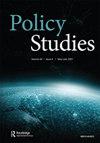Faith-based actors as climate intermediaries in Scottish climate policy
IF 2.2
4区 管理学
Q2 PUBLIC ADMINISTRATION
引用次数: 6
Abstract
ABSTRACT Faith-based actors (FBAs) are increasingly active in climate policy, and a growing literature focuses on how specific faith characteristics (theological and organizational) might shape climate action. This paper examines an under-researched dimension of their action. Using the example of Christian FBAs in Scotland, we examine their distinctive role as “climate intermediaries” – “go-betweens” between policymakers and their policy targets. We construct a framework of three core intermediary capabilities – representation, mobilization, aggregation – and examine strategies adopted to implement those capabilities. Using documentary data we identify FBA involvement in domestic and global climate policy, examining how certain Christian FBAs seek to shape government policy, but also aim to change the actions and behaviours of their congregations and members. While FBA action has not alone shaped climate policy or agreements, we find their linkage role is distinct and multi-directional. First, by mediating “downwards”, FBAs mobilize action on global climate concerns within their own congregations. By converting parishioners’ religious concern into global action, these FBAs link the local to the global, but also the spiritual to the practical. FBAs also operate “upwards” to successfully aggregate specific theological knowledge, and translate it into a powerful, general moral imperative for climate action.以信仰为基础的行动者在苏格兰气候政策中的气候中介作用
基于信仰的行动者(FBAs)在气候政策中越来越活跃,越来越多的文献关注特定的信仰特征(神学和组织)如何影响气候行动。本文考察了他们行动的一个尚未得到充分研究的方面。以苏格兰的基督教联邦基金为例,我们考察了他们作为“气候中介”的独特作用——政策制定者和他们的政策目标之间的“中间人”。我们构建了一个由三个核心中介能力——代表、动员、聚合——组成的框架,并研究了实现这些能力所采用的策略。利用文献数据,我们确定了FBA对国内和全球气候政策的参与,研究了某些基督教FBA如何寻求塑造政府政策,但也旨在改变其会众和成员的行动和行为。虽然FBA的行动并没有单独影响气候政策或协议,但我们发现它们的联系作用是独特的、多向的。首先,通过“向下”的调解,fba在他们自己的教会内动员对全球气候问题的行动。通过将教区居民的宗教关注转化为全球行动,这些fba将地方与全球联系起来,也将精神与实际联系起来。fba还“向上”运作,成功地汇集了特定的神学知识,并将其转化为气候行动的强大、普遍的道德要求。
本文章由计算机程序翻译,如有差异,请以英文原文为准。
求助全文
约1分钟内获得全文
求助全文
来源期刊

Policy Studies
PUBLIC ADMINISTRATION-
CiteScore
5.40
自引率
4.50%
发文量
34
期刊介绍:
These changes at the structural level of the global system have impacted upon the work of public organizations either directly or indirectly and have broadened the field of action in policy studies. It has five main areas of intellectual interest: 1.To broaden the lens of policy analysis through the publication of research which locates policy-making within a theoretical, historical or comparative perspective. 2.To widen the field of enquiry in policy analysis through the publication of research that examines policy issues in a British, comparative, international or global context. 3.To promote constructive debate on theoretical, methodological and empirical issues in policy analysis.
 求助内容:
求助内容: 应助结果提醒方式:
应助结果提醒方式:


